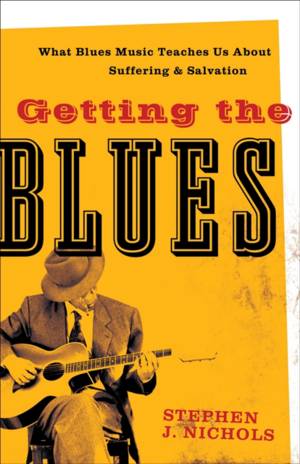
Bedankt voor het vertrouwen het afgelopen jaar! Om jou te bedanken bieden we GRATIS verzending (in België) aan op alles gedurende de hele maand januari.
- Afhalen na 1 uur in een winkel met voorraad
- In januari gratis thuislevering in België
- Ruim aanbod met 7 miljoen producten
Bedankt voor het vertrouwen het afgelopen jaar! Om jou te bedanken bieden we GRATIS verzending (in België) aan op alles gedurende de hele maand januari.
- Afhalen na 1 uur in een winkel met voorraad
- In januari gratis thuislevering in België
- Ruim aanbod met 7 miljoen producten
Zoeken
Getting the Blues
What Blues Music Teaches Us about Suffering and Salvation
Stephen J Nichols
Paperback | Engels
€ 27,45
+ 54 punten
Omschrijving
In Getting the Blues, Stephen Nichols shows how blues music offers powerful insight into the biblical narrative and the life of Jesus. Weaving Bible stories together with intriguing details of the lives of blues musicians, he leads readers in a vivid exploration of how blues music teaches about sin, suffering, alienation, and worship. Nichols unpacks the Psalms, portions of the prophets, and Paul's writings in this unique way, revealing new facets of Scripture.
Getting the Blues will resonate with all readers interested in Christianity and culture. In the end they will emerge with a greater understanding of the value of "theology in a minor key"--a theology that embraces suffering as well as joy.
EXCERPT
This book attempts a theology in a minor key, a theology that lingers, however uncomfortably, over Good Friday. It takes its cue from the blues, harmonizing narratives of Scripture with narratives of the Mississippi Delta, the land of cotton fields and Cyprus swamps and the moaning slide guitar. This is not a book by a musician, however, but by a theologian. And so I offer a theological interpretation of the blues. Cambridge theologian Jeremy Begbie has argued for music's intrinsic ability to teach theology. As an improvisation on Begbie's thesis, I take the blues to be intrinsically suited to teach a particular theology, a theology in a minor key. This is not to suggest that a theology in a minor key, or the blues for that matter, utterly sounds out despair like the torrents of a spinning hurricane. A theology in a minor key is no mere existential scream. In fact, a theology in a minor key sounds a rather hopeful melody. Good Friday yearns for Easter, and eventually Easter comes. Blues singers, even when groaning of the worst of times, know to cry out for mercy because they know that, despite appearances, Sunday's coming. . . . The blues, like the writings of Flannery O'Connor, need not mention him [Christ] in every line, or in every song, but he haunts the music just the same. At the end of the day, he serves as the resolution to the conflict churning throughout the blues, the conflict that keeps the music surging like the floodwaters of the Mississippi River.
Getting the Blues will resonate with all readers interested in Christianity and culture. In the end they will emerge with a greater understanding of the value of "theology in a minor key"--a theology that embraces suffering as well as joy.
EXCERPT
This book attempts a theology in a minor key, a theology that lingers, however uncomfortably, over Good Friday. It takes its cue from the blues, harmonizing narratives of Scripture with narratives of the Mississippi Delta, the land of cotton fields and Cyprus swamps and the moaning slide guitar. This is not a book by a musician, however, but by a theologian. And so I offer a theological interpretation of the blues. Cambridge theologian Jeremy Begbie has argued for music's intrinsic ability to teach theology. As an improvisation on Begbie's thesis, I take the blues to be intrinsically suited to teach a particular theology, a theology in a minor key. This is not to suggest that a theology in a minor key, or the blues for that matter, utterly sounds out despair like the torrents of a spinning hurricane. A theology in a minor key is no mere existential scream. In fact, a theology in a minor key sounds a rather hopeful melody. Good Friday yearns for Easter, and eventually Easter comes. Blues singers, even when groaning of the worst of times, know to cry out for mercy because they know that, despite appearances, Sunday's coming. . . . The blues, like the writings of Flannery O'Connor, need not mention him [Christ] in every line, or in every song, but he haunts the music just the same. At the end of the day, he serves as the resolution to the conflict churning throughout the blues, the conflict that keeps the music surging like the floodwaters of the Mississippi River.
Specificaties
Betrokkenen
- Auteur(s):
- Uitgeverij:
Inhoud
- Aantal bladzijden:
- 192
- Taal:
- Engels
Eigenschappen
- Productcode (EAN):
- 9781587432125
- Verschijningsdatum:
- 1/09/2008
- Uitvoering:
- Paperback
- Formaat:
- Trade paperback (VS)
- Afmetingen:
- 137 mm x 211 mm
- Gewicht:
- 226 g

Alleen bij Standaard Boekhandel
+ 54 punten op je klantenkaart van Standaard Boekhandel
Beoordelingen
We publiceren alleen reviews die voldoen aan de voorwaarden voor reviews. Bekijk onze voorwaarden voor reviews.









